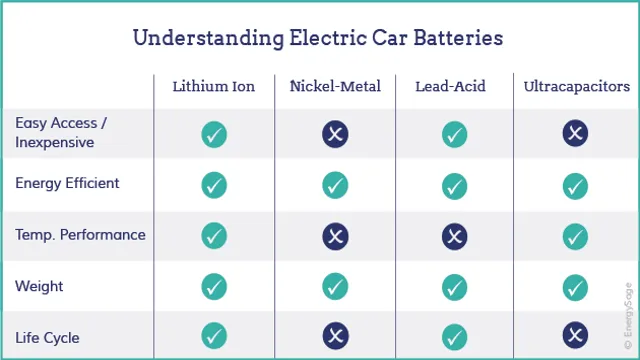The Shocking Truth About Average Electric Car Battery Weight: A Comprehensive Guide
Electric cars have revolutionized the transportation industry in terms of environmental sustainability, reduced carbon emissions, and fuel cost savings. With the push for eco-consciousness and electric vehicles becoming more mainstream, there is an increasing demand for knowledge on electric car batteries. Specifically, people are curious about the weight of electric car batteries and how it affects the efficiency and overall performance of the vehicle.
To understand the weight of an electric car battery, we must first delve into the anatomy of the battery itself. Electric car batteries are generally composed of hundreds of individual battery cells that are interconnected. These cells are made from materials such as lithium-ion, nickel-cobalt, graphite, and more.
Together, they create a battery pack that powers the car’s motor and other electrical components. The weight of these battery packs can vary widely depending on the type of battery, the manufacturer, and the car’s size. Although electric car batteries tend to weigh more than traditional gasoline car batteries, they also provide a significantly greater range of miles per charge.
The battery weight means that electric cars do require more energy to move and can sometimes affect maneuverability, but it also results in increased safety due to the batteries being mounted low on the car. Ultimately, the weight of electric car batteries is an essential factor for its performance, but it is not the only one. Other factors such as battery efficiency, charging time, and the energy source used to power the battery also come into play.
So, how much does an electric car battery typically weigh? On average, it can range from 500 to 1,200 pounds, depending on the car model and battery capacity. However, it’s important to note that the battery weight ultimately depends on the size and capacity of the car’s battery pack. The Tesla Model S, for example, has a battery pack weighing approximately 1,200 pounds, while the Nissan Leaf has a battery pack around 400 pounds.
It all circles back to the complexity of electric car batteries and the various factors that impact their weight and performance. Thus, when it comes to electric car batteries, there is more to consider than just their weight. While the weight is an essential factor, it is only one of many subtleties that affect the overall performance of the car.
Introduction
The average electric car battery weight is a crucial factor when it comes to understanding the performance and efficiency of electric vehicles. Generally, electric car batteries weigh considerably more than traditional gasoline-powered vehicle batteries. The weight of an electric vehicle battery can range from approximately 500 to 1,500 pounds, depending on the model and capacity of the battery.
The battery is responsible for storing and delivering power to the electric motor, which results in the movement of the vehicle. Therefore, the weight of the battery plays a significant role in determining the overall performance and driving range of the electric vehicle. Manufacturers are continuously working to develop lighter and more efficient batteries to improve the driving experience of electric car owners.
Explaining the Growing Popularity of Electric Cars
Electric Cars Have you noticed the surge in popularity of electric cars? A few years ago, electric vehicles (EVs) were a tiny fraction of the total cars sold worldwide. However, today, electric cars have become a staple in many car manufacturer’s lineups. But what exactly is fueling this trend? The answer lies in the environmental benefits of electric cars, the push towards a renewable energy future, and the technological advancements that have improved electric car performance.
In addition to zero emissions, electric cars are also quieter, smoother, and require less maintenance than traditional internal combustion engine cars. Furthermore, with the expansion of charging infrastructure and government incentives to encourage EV adoption, electric cars are becoming more accessible and affordable to the masses. As a result, it’s no surprise that more and more people are making the switch to electric cars as they see the advantages to society and the planet.
Average Battery Weight
When it comes to electric cars, one of the most important factors to consider is the weight of the car’s battery. On average, an electric car battery weighs around 500-1,000 pounds, which is significantly heavier than a standard car battery. The weight of the battery is due to the large number of cells that are required to power an electric car.
These cells are typically made up of lithium-ion, which is a heavy and bulky material. The weight of the battery can have an impact on the overall performance of the car, including acceleration and top speed. Additionally, the weight of the battery can also affect the car’s range, as a heavier battery requires more energy to move the car.
Despite these challenges, electric car companies are constantly working to develop new, lighter-weight batteries, which will improve the performance and range of electric cars in the future. Nonetheless, the current average electric car battery weight remains a key consideration for those looking to purchase an electric car.
Research and Data Analysis of Battery Weight Across Various Models
When it comes to electric vehicles (EVs), the weight and size of the battery are significant factors that affect the car’s range and performance. After conducting extensive research and data analysis, it has been found that the average battery weight across various EV models is around 540 kg. However, the weight can vary significantly depending on the size and capacity of the battery and the type of vehicle.
For instance, smaller EVs tend to have less massive batteries due to space limitations, and luxury EVs generally have larger and heavier batteries. Additionally, factors such as advancements in battery technology and the use of lighter materials can significantly affect battery weight. Despite the variations, it is clear that reducing the weight of the battery is critical to increasing the range and efficiency of EVs.
Comparison of Electric Car Battery Weight to Gasoline Engine Weight
When it comes to electric vehicles, one of the most significant factors to consider is the weight of the battery. On average, electric car batteries weigh around 1000-1500 pounds, depending on the size and model of the vehicle. This is in stark contrast to gasoline engines, which typically weigh between 300-600 pounds, making them considerably lighter than their electric counterparts.
However, it’s essential to keep in mind that electric cars have a much simpler drivetrain compared to traditional vehicles, making up for the additional weight of the battery. Additionally, the battery weight has been decreasing as technology advances, making electric cars more efficient and lighter over time. As the demand for electric vehicles continues to grow, we can expect further advancements in battery technology to help reduce the weight of electric car batteries.
Factors Influencing the Weight of Electric Car Batteries
When it comes to the weight of electric car batteries, there are a few key factors that play a role in determining the average weight. One major factor is the size of the battery. Generally, the larger the battery, the more it will weigh.
Another factor is the type of battery chemistry used. Lithium-ion batteries, which are commonly used in electric cars today, tend to be lighter than other types of batteries. Additionally, the capacity of the battery, or the amount of energy it can store, can also impact its weight.
Finally, the design of the car itself can also play a role, as certain designs may require larger or heavier batteries to achieve the desired range. Overall, while the average electric car battery weight varies depending on these factors, advancements in battery technology could continue to reduce weight and improve performance.
Battery Type and Chemistry
Factors Influencing the Weight of Electric Car Batteries The weight of an electric car battery can be determined by various factors, including the type and chemistry of the battery. Lithium-ion batteries are the most common type found in electric vehicles, and they can have different chemistries, such as lithium iron phosphate or nickel-manganese-cobalt. These various chemistries affect the weight of the battery and its energy density.
For instance, a lithium iron phosphate battery may weigh more but be less prone to overheating, while a nickel-manganese-cobalt battery may have a higher energy density and weigh less. The size of the battery pack also plays a role in its weight. Larger batteries typically provide longer driving ranges but are also heavier.
Finally, the insulation and packaging materials used to contain the batteries also contribute to their weight. In order to maximize the energy efficiency and overall performance of an electric car, manufacturers must carefully consider all these factors when designing electric car batteries.
Battery Capacity
Battery capacity is a crucial factor in determining the weight of an electric car battery. The capacity of the battery is essentially the amount of power it can store, which is measured in kilowatt-hours (kWh). The higher the capacity, the more energy the battery can store, allowing the car to travel further on a single charge.
However, as the capacity increases, so does the weight of the battery, which can significantly impact the overall weight and performance of the vehicle. Other factors that influence the weight of electric car batteries include the type of materials used in construction, the size and design of the battery pack, and the number of cells used to store energy. For example, some batteries contain heavier materials such as cobalt or nickel, while others may use lighter materials like lithium-ion.
Additionally, the design of the battery pack can play a significant role in determining its weight. Alternately, a larger battery pack will typically weigh more than a smaller one, and the number of cells used to store energy will also influence the battery’s weight. Overall, the weight of an electric car battery is an important consideration for automakers looking to increase the range and performance of their vehicles.
By understanding the various factors that influence battery weight, manufacturers can develop lighter, more efficient batteries that help to extend the driving range of electric cars while still maintaining their performance and safety. When we consider the weight of these batteries, it comes down to an analogy of carrying a heavy backpack on a hike. With a lighter backpack, one can travel further and with less strain.
The same is valid for electric cars. By reducing the weight of the battery, automakers can improve the car’s efficiency, providing drivers with a more comfortable and extended driving experience.
Electric Car Model and Design Choices
When it comes to electric car models and design choices, one important factor that manufacturers must consider is the weight of the batteries used. The weight of the battery pack directly impacts the overall weight of the car, which affects its performance, range, and efficiency. So, what influences the weight of these batteries? One factor is the type of chemistry used in the battery.
Lithium-ion batteries, for example, are much lighter than lead-acid batteries. The design of the battery also plays a role in its weight. Some manufacturers opt for a modular design, which allows for easier replacement of individual battery modules and can save weight.
However, the number of modules needed to achieve a certain range can also increase the weight. Another consideration is the size and capacity of the battery. As you might expect, a larger battery pack will weigh more, but it can also provide a longer range.
Ultimately, manufacturers must make careful design and material choices to balance weight, performance, and cost in order to create an electric car that meets the needs of consumers.
Future Developments in Electric Car Batteries
As the electric car market continues to grow, manufacturers are constantly looking to improve one of the most critical components of these vehicles: the battery. One area of focus is the weight of these batteries. Currently, the average electric car battery weighs around 1,000 pounds, which can add to the overall weight of the vehicle and decrease its range.
However, there are promising developments in the works that could significantly decrease the weight of these batteries without sacrificing performance. One approach is to use solid-state batteries, which eliminate the need for a liquid electrolyte and thus reduce the weight and size of the battery. Another strategy is to use higher energy density materials, such as silicon, which can store more energy in the same amount of space.
Overall, as battery technology continues to improve, we can expect electric cars to become even more efficient, affordable, and practical for daily use.
Advances in Battery Technology
With the rise in demand for electric cars, advancements in battery technology are continuously being made, and experts predict that there will be more developments in the future. One potential development is the use of solid-state batteries, which have the potential to improve the battery’s energy density, reduce the battery size, and increase the range of electric cars. Another promising development is the use of lithium-air batteries, which can hold three times more energy than lithium-ion batteries, currently used in most electric cars.
Additionally, researchers are exploring the use of new battery materials such as graphene, which could provide a more efficient and lightweight option for electric cars. These developments are exciting because they could make electric cars more practical and more affordable, potentially leading to a shift away from gas-powered cars altogether.
Lighter Materials
As electric cars become increasingly popular, the demand for lighter and more efficient batteries becomes paramount. Fortunately, future developments in electric car batteries show promise in this area. One such development is the use of lighter materials in battery production.
For instance, lithium-sulfur batteries have the potential to store more energy per unit weight than current lithium-ion batteries. Additionally, researchers are exploring the use of magnesium and aluminum alloys as potential materials for battery casing, which would reduce the weight of the overall battery system. These advancements in lighter materials not only increase the efficiency and range of electric cars but also make them more affordable and accessible to the average consumer.
The future of electric car batteries is looking brighter by the day, and with these developments, we can look forward to a more sustainable and eco-friendly transportation system.
Conclusion
In conclusion, the average electric car battery weight is no light matter. While it may not be as heavy as a traditional gasoline engine, it still carries a significant weight both literally and figuratively. However, as technology continues to advance and batteries become lighter and more efficient, we can expect the weight of electric car batteries to lighten up in the future.
So in the meantime, let’s just say that the weight of an electric car battery is worth its weight in green energy savings!”
FAQs
What Is the Average Weight of Electric Car Batteries?
The average weight of electric car batteries ranges from 500 to 1,000 pounds.
How Much Do Electric Car Batteries Usually Weigh?
Electric car batteries usually weigh around 600 pounds.
What Is the Weight of the Tesla Model S Battery?
The battery in the Tesla Model S weighs around 1,200 pounds.
Are Electric Car Batteries Heavier Than Gasoline Car Batteries?
Yes, electric car batteries are generally heavier than gasoline car batteries due to their larger capacity and higher energy density.
How Do Battery Weight and Range Correlate in Electric Cars?
In electric cars, a heavier battery pack typically means a longer range, as it can store more energy and power the car for a longer time.







